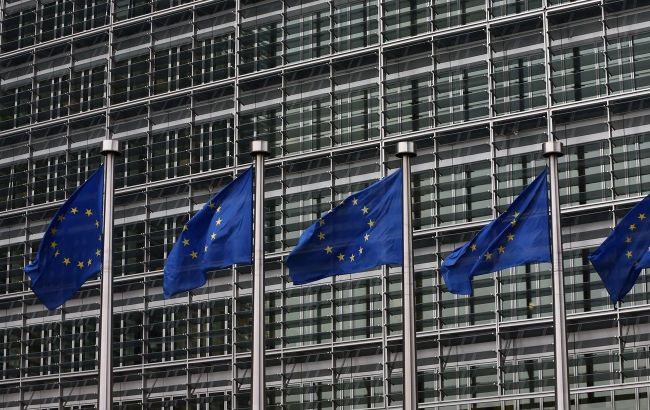European Commission reveals NATO Summit's Ukraine Compact details
 Photo: European partners of Ukraine signed a joint declaration regarding the Ukraine Compact (Getty Images)
Photo: European partners of Ukraine signed a joint declaration regarding the Ukraine Compact (Getty Images)
Leaders of 20 European Union member countries issued a joint declaration, explaining the essence and objectives of the Ukraine Compact agreement signed on the sidelines of the NATO Summit in Washington.
In the statement, the leaders highly valued the security agreements and arrangements made with Ukraine by 20 countries and the European Union as part of the Joint Declaration of Support for Ukraine, announced on the sidelines of the NATO Summit in Vilnius in 2023. They also welcomed all other signatories of the Joint Declaration who will soon complete their respective security agreements and arrangements with Ukraine.
The summit participants confirmed that the security of Ukraine is an integral part of the security of the Euro-Atlantic region and beyond, and expressed their intention to support Ukraine until it defeats Russian aggression.
The signatories of the statement emphasized their unwavering commitment to a free, independent, democratic, and sovereign Ukraine capable of defending itself and deterring future aggression. They also reaffirmed Kyiv's sovereign right to choose its security mechanisms as well as its political, social, economic, and cultural systems.
The agreement participants stressed that Russia's illegal and unprovoked invasion of Ukraine is incompatible with their security interests, poses a threat to international peace and security, and is a gross violation of international law, including the UN Charter.
They recognized Ukraine's commitment to reforms aimed at strengthening democracy, the rule of law, respect for human rights, and media freedom, which are necessary to advance its Euro-Atlantic aspirations. They also highlighted shared values and interests, including respect for the principles of the UN Charter, such as sovereignty and territorial integrity.
"Today, we announce the Ukraine Compact with a view towards coordinating and accelerating our collective efforts to meet Ukraine's comprehensive security needs, as outlined in the Joint Declaration and in the security agreements and arrangements each of the signatories has completed with Ukraine," the document states.
By this, the signatories declared their unwavering intention and commitment to ensure Ukraine's ability to successfully defend its freedom, independence, sovereignty, and territorial integrity today and to deter acts of aggression in the future.
Commitments of the signatories
To achieve the vital goals outlined in the respective bilateral security agreements and arrangements, and following all applicable laws and their respective legal systems, the parties to the agreement pledge to:
- Support Ukraine's immediate defense and security needs, including through the continued provision of security assistance and training, modern military equipment, and defense industrial and necessary economic support, working bilaterally and through existing multilateral mechanisms, including the Ukraine Defense Contact Group (UDCG) and its Capability Coalitions, NATO Security Assistance and Training for Ukraine (NSATU), and the EU Military Assistance Mission in support of Ukraine (EUMAM Ukraine);
- Accelerate efforts to build a Ukrainian future force that maintains a credible defense and deterrence capability, including by convening within 6 months at the level of Defense Ministers through the UDCG to review and approve roadmaps prepared by the leaders of the Capability Coalitions — each a Compact Signatory — on future force development through 2027, in coordination with NSATU and EUMAM Ukraine, with a view to continue strengthening the force into the 2030s; and
- In the event of a future Russian armed attack against Ukraine following the conclusion of current hostilities, convene swiftly and collectively at the most senior levels to determine appropriate next steps in supporting Ukraine as it exercises its right of self-defense as enshrined in Article 51 of the UN Charter, including the provision of swift and sustained security assistance and the imposition of economic and other costs on Russia.
The signatories of the Joint Declaration committed with unwavering determination to adhere to these commitments, using the multilateral security architecture that supports Ukraine, in accordance with their respective national laws and security and defense policies.
The Compact Signatories plan to fulfill these commitments as Ukraine continues its path to future membership in the EU, NATO, and the broader Euro-Atlantic community.
"Other countries that wish to contribute to this effort to ensure a free, democratic, independent, and sovereign Ukraine may join this Compact upon completion of a bilateral security agreement or arrangement with Ukraine," the agreement states.
The Joint Declaration was signed by the leaders of the United States, Belgium, Canada, Denmark, Estonia, Finland, France, Germany, Iceland, Italy, Japan, Latvia, Lithuania, Luxembourg, the Netherlands, Norway, Poland, Portugal, Spain, Sweden, and the United Kingdom. The document was also signed by the President of the European Council, the President of the European Commission, and the President of Ukraine.
Ukraine Compact
On July 9-11, a NATO summit took place in Washington.
Following the meeting, US President Joe Biden presented a new agreement regarding Ukraine - Ukraine Compact. Its goal is to unite over 20 states that have concluded bilateral security agreements with Kyiv.
The signatories committed to providing Ukraine with ammunition, weapons, and training to resist Russian aggression. The agreement participants also committed to helping Ukraine create an army to defend Ukraine and deter new Kremlin aggression.
Additionally, during the meeting, the US announced a new package of military assistance for Ukraine, which includes Patriot air defense systems and ammunition.
Besides the Patriot and SAMP-T systems, partners also intend to provide Ukraine with dozens of tactical air defense systems.

